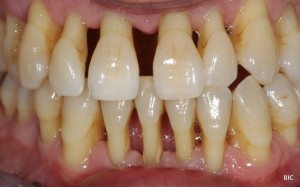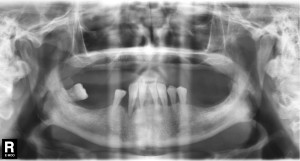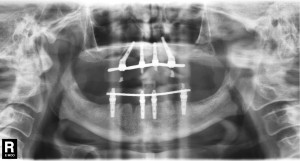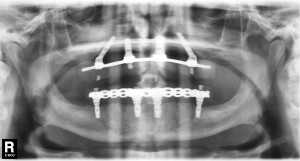Gum Disease
Gum disease also known as periodontal disease is a condition which affects the tissues surrounding and supporting natural teeth. If left untreated the gum disease will eventually lead to the teeth becoming mobile and loss of teeth. The first signs of the problems may be bleeding of the gums when brushing or flossing, redness, halitosis and loose teeth.
The exact causes for the disease are not always the same. However it has been proven that the problem starts with a particular type of bacteria that colonises the teeth and gums. Our bodies reaction to fight these bacteria leads to a destructive process of the supporting tissues holding natural teeth.
How common is gum disease
According to Wikipedia gum disease is the second most common disease in the world, after tooth decay. It is thought to affect between 35%- 50% of the adult population although only 10% have the aggressive types of periodontitis. The disease is most commonly found in individuals with poor or moderate levels of oral hygiene. The lack of daily brushing and flossing will predispose one to becoming susceptible to the problem.
Treatment of gum disease
The most important phase of treatment involves being aware of what is actually causing the problem. Several factors like oral hygiene, age, sex, stress, diet and social habits ( like tobacco smoking and alcohol ) will influence the development of gum disease. If possible trying to improve the oral hygiene will be one of the most important factors. Certain issues like genetic predisposition will not be possible to change hence it is then important to focus on the other factors that can be altered and changed.
Improving oral hygiene by careful and meticulous brushing and flossing. After brushing and flossing it is important that inspection of the teeth is carried out to make sure that no deposits or plaque are left behind.
What treatment is there available after losing teeth
Once an individual has lost teeth due to gum disease, the common solutions are removable dentures, fixed bridges on natural teeth or implants. It is common that patients opt for removable dentures if multiple teeth have been lost. However coping with removable dentures is not easy and overall it affects your general well being. Many patients become dependent on adhesives and denture fixatives in order to help stabilise the dentures. Many choose to shy away from social events as they are embarrassed of their teeth. Denture often move during eating and speaking and this movement also causes sores and irritation in the mouth.
Dental implants can provide hope for patients who have lost teeth due to gum disease.
Clinical case of dental implant treatment for patient with advanced gum disease
The patient presented to our clinic for advice for replacing the removable dentures he had after losing his teeth to gum disease. The patient was wearing a full upper denture and had multiple lower teeth which were very mobile. The patient told us that since he knew how difficult it was to cope with the upper full denture he was holding onto his natural lower teeth for as long as possible in order to avoid having dentures all together.
The patient was given the option of replacing the removable upper denture with fixed dental implants with a bridge. The upper arch was completed first. After the patient saw the benefit of the upper fixed bridge on dental implants, he requested that the same treatment be done on the lower jaw.
After a few appointments the patient had completed the upper and lower jaw. The radiographs show how the implants support the fixed bridge work. The bridges are made of talladium and acrylic. For more information please Contact Brighton Implant Clinic or Call us on 0800 111 6623





